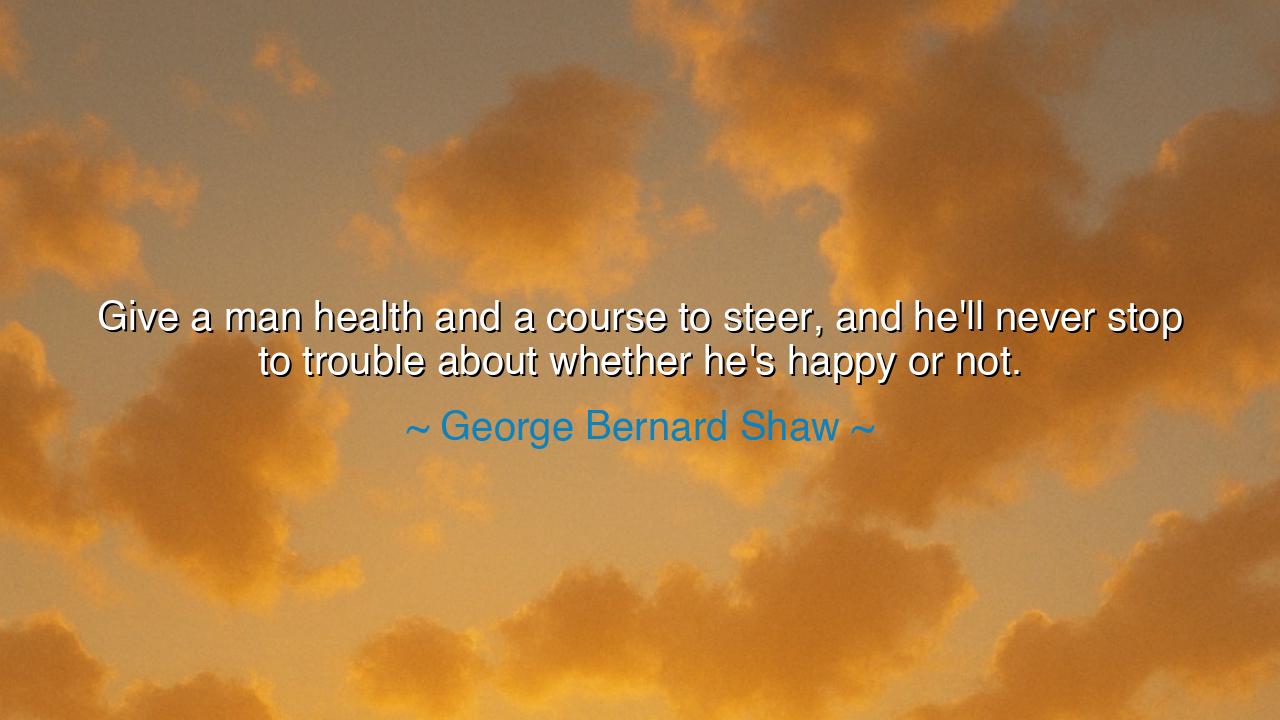
Give a man health and a course to steer, and he'll never stop to
Give a man health and a course to steer, and he'll never stop to trouble about whether he's happy or not.






In the piercing and timeless words of George Bernard Shaw, playwright and philosopher of human nature, there echoes a truth both simple and profound: “Give a man health and a course to steer, and he’ll never stop to trouble about whether he’s happy or not.” These words, though crafted in the language of wit, bear the deep wisdom of the ancients. Shaw, who spent his life observing the struggles of men and the follies of society, understood that happiness is not found in idle pursuit, but in purpose — that when a man’s body is strong and his path is clear, joy arises naturally, as light follows the dawn.
Health and direction — these are the twin pillars upon which the fullness of life is built. To give a man health is to free him from the shackles of weakness, pain, and decay; to give him purpose is to ignite the fire of meaning within his soul. Without health, the mind falters, and even the noblest ambitions crumble into frustration. Without direction, the spirit wanders aimlessly, restless and unfulfilled. Shaw’s insight reveals that the secret to contentment lies not in chasing happiness as a possession, but in cultivating the conditions that allow it to bloom — a sound body and a clear mission.
The origin of this truth lies deep in the understanding of the human spirit, which has been echoed by sages across time. The Greek philosopher Aristotle called happiness “eudaimonia” — not mere pleasure, but the flourishing of a life lived in excellence and purpose. He, too, taught that happiness is not a goal to be seized but the natural result of living rightly, with strength, virtue, and clarity. So when Shaw speaks of health and a course to steer, he is not offering comfort to the lazy, but calling men to discipline, to vigor, to the noble work of shaping life with intention. For the man who lives with strength and direction does not need to question whether he is happy — his very being sings the answer.
History is rich with those who proved this truth through their lives. Consider the journey of Ernest Shackleton, the Antarctic explorer. When his ship was crushed in the ice and his men stranded in the frozen void, he did not despair or sit to ponder his happiness. He cared for their health, he gave them purpose, and he steered them — literally and spiritually — toward survival. Through storms and hunger and endless night, his leadership and their shared discipline preserved not only their bodies, but their will to live. They endured not because they sought joy, but because they had direction, and in that direction, they found strength greater than pleasure itself.
Shaw’s quote carries a warning, too, for the modern soul: that endless reflection upon happiness often destroys the very peace it seeks. The one who forever asks, “Am I happy?” is like a sailor who, in calm seas, stops rowing to study the horizon. His boat drifts, his purpose falters, and soon the stillness he once enjoyed turns to despair. The ancients knew this well. The Stoics taught that virtue, not pleasure, was the root of happiness; that to live rightly was enough, and joy would follow as a shadow follows the body. Health keeps the vessel strong; purpose keeps the oar in motion. Together, they guide the soul away from the storm of anxiety that comes from self-centered longing.
To live by Shaw’s wisdom is to live with balance. First, tend to the body — not for vanity, but for reverence. Feed it with moderation, move it with discipline, rest it with respect. A healthy body is not merely a strong one; it is a vessel through which energy flows freely, allowing the spirit to act without hindrance. Then, find your course — a calling, a work, a service — something greater than comfort, something that draws forth your best self. For purpose, once found, is the compass that turns ordinary life into sacred journey.
The lesson, then, is this: stop chasing happiness; build it. Make your life an offering of health, strength, and direction. When your body is whole and your purpose true, happiness will no longer be a question to ask, but a state to live. Seek not constant pleasure, but steady progress. Nourish your body as a temple, and your spirit as its flame. When you rise each morning with strength in your limbs and a goal in your heart, the very act of living will fill you with quiet joy.
So remember the eternal wisdom of George Bernard Shaw: “Give a man health and a course to steer, and he’ll never stop to trouble about whether he’s happy or not.” Do not waste your life in the search for fleeting feelings. Instead, anchor yourself in wellness and direction, and happiness will flow through you like the wind fills a sail — unseen, unstoppable, and utterly natural. For in the harmony of body and purpose, the human soul becomes what it was always meant to be: strong, peaceful, and truly alive.






AAdministratorAdministrator
Welcome, honored guests. Please leave a comment, we will respond soon